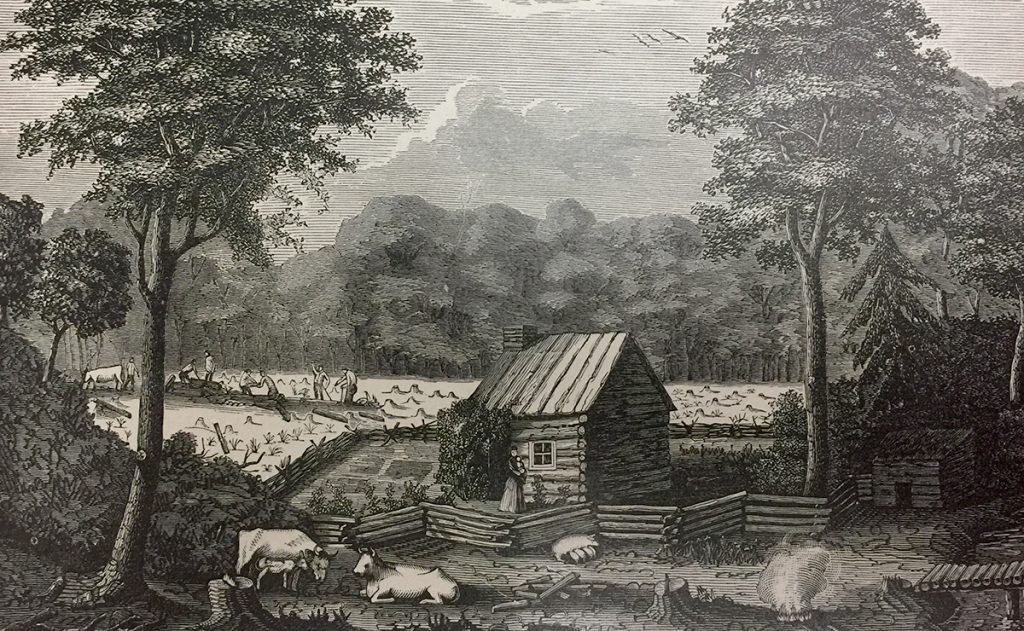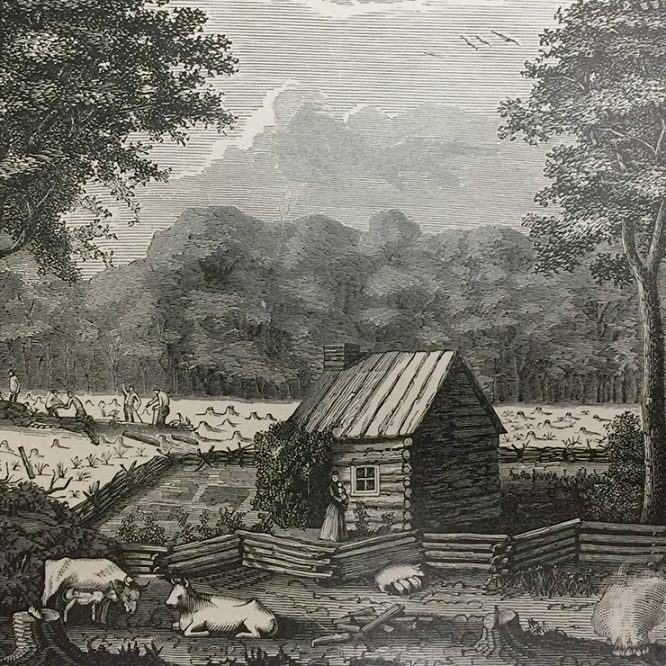
A pioneer settlement as depicted in the Historical Album of Orleans County (1879)
Vol. 4, No. 30
On September 10, 1810, eight men from Stockbridge, Massachusetts signed a contract binding one another to a settlement on the Holland Land Purchase in Western New York. These men were unsure of what they would encounter in the virgin woods of the Genesee Country where land was scarcely settled, and neighbors few and far between. When gazing upon the text of this agreement, the articles read like a manifesto built upon a foundation of communism. Now this is not to say that these pioneers sought to establish any semblance of a communist society in the wilderness of Carlton, but the premise of this collective was to share the fruits of labor.
The first line of Article 1 read, “…for the purpose of our better accommodation and mutual benefit, we do and have resolved ourselves to one respective body or company…” That organization established under the name of the “Union Company,” was formed with the purpose of sharing labor while providing the freedom to purchase land without limitation by the group.
Although such record was lost, a secretary was selected by the company to track the progress of the expedition while maintaining a record of “…whatever has been furnished, and by whom, as well as the value of said articles…” Any man putting forth a disproportionate amount of funds would be justly compensated by the group.
Articles 6-18 set forth the specifics of share labor and resources. For two years after the signing of this contract, each man was responsible for furnishing labor for other members of the company. In order to avoid potential conflicts within the group, a proportional amount of wood was to be consumed from each man’s land to allow for the growing of crops and planting of orchards.
Perhaps the most interest of the 18 articles is Article 8 which reads, “We agree that the avails of our joint labor, of whatever kind it may be, shall be equally distributed among said body or company not having any reference to the lands or owners of said lands from whence said avails proceeded.” This stipulation prevented any one man from focusing too much attention on his own interests while neglecting the interests of the others. The mentality conveyed in this article followed throughout the remaining articles, including one that provided for the construction of houses and barns, none of which were to exceed the expense of the first house and barn constructed.
Although a communal mentality was present, the group was not responsible for debts incurred by an individual. An “out” was provided for those who succumbed to the unfortunate trials and tribulations of the frontier, understanding “…that it is possible that the best human calculations are often thwarted and disappointed, and the best intentions are sometimes providentially rendered incapable of performing these most solemn vows…”
The list of signers included Minoris Day, Fitch Chamberlain, Charles Webster, Anthony Miles, Selah Beardsley, Moses Barnum, Russell Smith, and Giles Slater. According to Isaac Signor in Landmarks of Orleans County, Russell Smith never took up his land in Carlton, while Charles Webster lost his pocketbook and money in Lake Ontario while on a trip to Canada. The latter left the area and never returned.
These men arrived in Carlton, mostly single, where they held “Bachelor’s Hall.” This particular site is often mistaken for a Bachelor’s Settlement, where single men arrived together to settle a particular location. A Bachelor’s Hall is a boarding house where men shared living quarters while establishing themselves on their own land; a common practice for that time. The one exception to the bachelor title was Anthony Miles who was already married but left his wife in Massachusetts while he established himself in Carlton. He returned to New England in 1812 and brought his bride to their new home. Fitch Chamberlain and Giles Slater followed suit, each returning to Massachusetts, marrying, and returning to Carlton with their wives.
Based on available information and maps from the Holland Land Company, these men settled near each other along the southern shore of Lake Ontario. According to Signor, Minoris Day, Moses Barnum, and Fitch Chamberlain settled adjacent to one another just west of the Oak Orchard Harbor. Selah Beardsley and Giles Slater settled about one-half mile east of Kuckville on land now occupied by Lakeside Beach State Park; Anthony Miles settled three-quarters of a mile south of Kuckville. As the Orleans County Historical Association prepares to dedicate a sign over Beardsley Creek in Gaines, it is important to note that this waterway was named for Selah Beardsley of the Union Company and not Levi Beardsley as previously reported.

